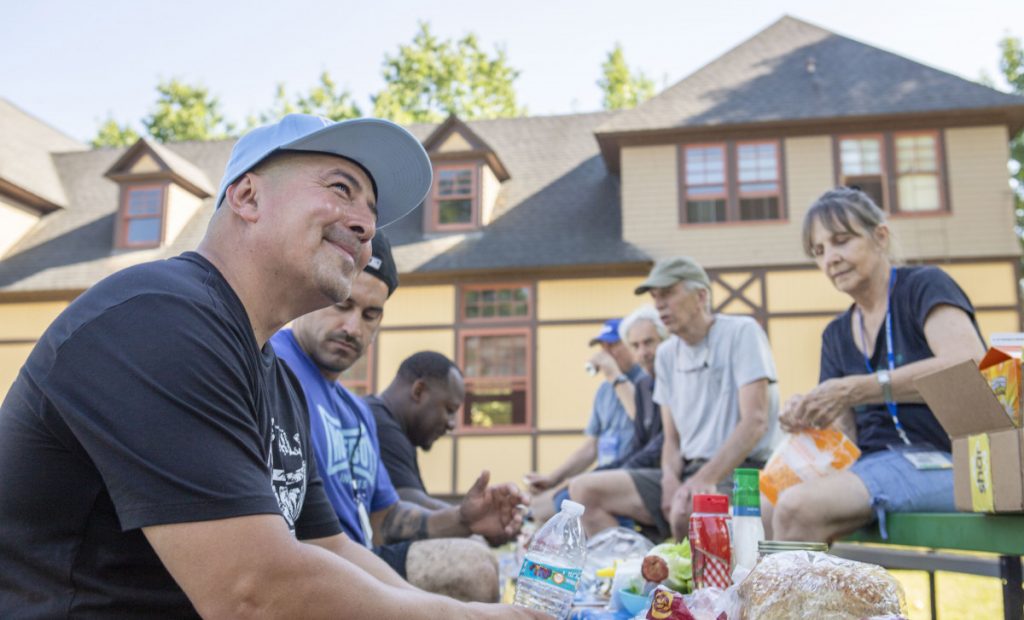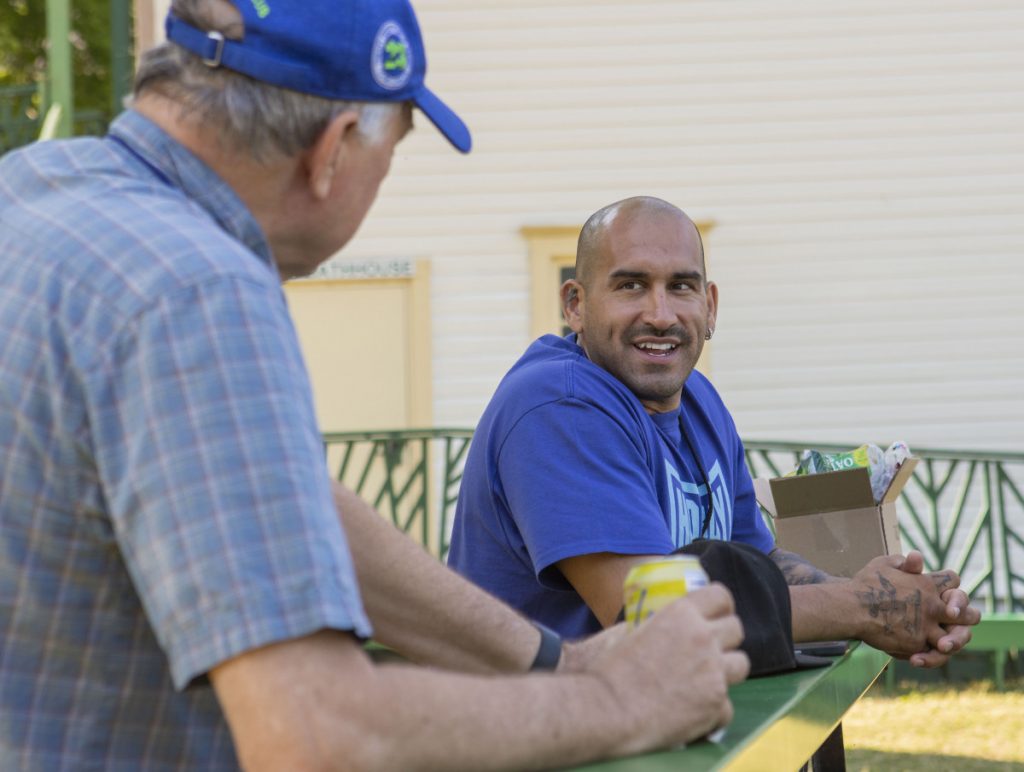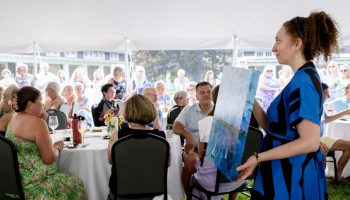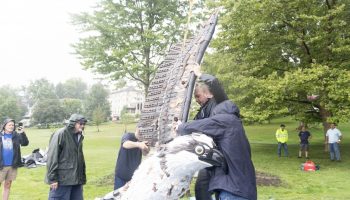It was one of the hottest days of the summer, and the patio umbrella outside Afterwords Café was no match for the beating sun. Three Homies, as members of Homeboy Industries are called — Steve Avalos, Junior Sanchez and Chris Miller — picked up a table and moved it further into the shade, insisting the Daily reporter with them take the shadiest spot.
The breeze was flowing and drinks were secured. Avalos chose a vanilla iced coffee, black. Sanchez went for a caramel Frappuccino topped with a swirl of pillowy whipped cream. Miller stuck with ice water. When a Chautauquan brought over the drinks, Avalos told her, “You’re the bestest, from Long Beach to Texas.”

Fr. Greg Boyle, SJ, the Week Four chaplain and a regular speaker at the Institution, founded Homeboy Industries in 1988 in order to improve the lives of former gang members in Los Angeles. In the intervening years, the organization has grown into the world’s largest gang intervention, rehabilitation and reentry program. It offers resources like skills training, housing and employment to men and women who have recently been released from prison and are trying to leave the world of gangs behind.
For nearly 10 years, Homies have been coming to visit the Institution for weeklong stays. Director of Religion Maureen Rovegno said that when Boyle first came to Chautauqua in 2012, “everybody just fell in love with him, and everyone said, ‘Come back, but bring the Homies.’ So when he came back the next year, he brought two Homies with him.” One of those Chautauquans who fell in love with Homeboy Industries was Deb First, and she’s been working to coordinate the Homies’ visits ever since.
“We started this program because we remembered that Chautauqua began as a place for sabbatical for ministers, and our conclusion was that nobody works harder than Homeboys,” First said. “So we thought Homeboys and Homegirls should come and have a sabbatical.”
Avalos, who now serves as co-director of case management and navigation along with a Homie named Jose Arellano, came from a multigenerational family of gang members, as did Sanchez. Meanwhile, Miller was the youngest of seven children raised by a single mother, and he started running away, couch-surfing – and had joined a gang – at 11. He started doing drugs when he was 12.
“I just didn’t have no guidance,” Miller said. “I was lost. I ran to the homies in the hood for the wrong reasons.”
Miller dropped out of high school around tenth grade and got arrested for the first time shortly thereafter for robbing a pizza delivery driver. What followed was several decades in which he was in and out of prison, participating in Homeboy Industries, but with one foot out the door.

“As I got older, I started realizing life is more than just making the wrong choices,” Miller said. “Sometimes, you do need a helping hand, but I was too proud to ask for help.”
When Miller got out of prison for the second time, he was in no rush to make another return to Homeboy Industries. He assumed that because they had already given him two chances, they would not be offering him a third. He walked through the doors again in 2018, and Boyle sat Miller down in his office, asking him where he’s been and why he wasn’t in the program.
“I said, ‘Pops, I done messed up too many times. I ain’t going to keep messing up, and you’ve got to give me chances,’ ” Miller said. “He’s like, ‘Son, this program is for you. You ain’t going to get it right the first time, but that’s alright.’ ”
Miller moved through the organization’s 18-month rehabilitation program, thinking he had to get it right this time, and eventually got a job as a case manager. He now manages a caseload of 37 people, guiding them as they try to figure out their lives.
Sanchez first went to prison for attempted murder at 18, right after he graduated high school. Like Miller, he was in and out of prison for years. He completed an eight-year sentence about 10 months ago. Upon his release into a reentry program, he was wearing an ankle monitor, only able to leave to go to work. Sanchez reached out to Homeboy Industries and Avalos and Arellano gave him work as a tattoo removal specialist.
Now, Sanchez works as a youth navigator and has been reunited with his wife and children. He’s living a life he never dreamed was possible.
“My experiences with Homeboy Industries have been life-changing,” Sanchez said. “I was so used to living a certain lifestyle, and I got to meet a lot of gang members, like Steve and Jose, who are my role models. They once lived that same lifestyle that I lived, going to the streets, gangbanging, doing whatever to make money, and how they changed their life inspired me to do good and change my life. I tell myself, ‘If they can do it, why can’t I do it?’ ”
Avalos went to prison at 17, serving a 17-year sentence. He said the governor of California released him because Boyle had a place for him at Homeboy Industries.
“Going in there, the relationships and connecting with people — in prison, your dignity is stripped,” Avalos said. “And then Homeboys is a place of humor, and humor is healing. There’s jokes; you laugh from your stomach. In prison, you’re serious. At Homeboys, everything was the opposite of everything I lived, and I loved it. I’ve come to Homeboys, I’m just part of the program, and I’ve been drenched with the love of Homeboys.”
As the co-director of case management and navigation, Avalos is often the first person new Homeboys and Homegirls encounter. He is passionate about cultivating an environment of kinship and trust.
“Who we are, if you ask what’s more important, strategy or culture, it’s culture,” Avalos said. “It’s implementing a culture of everybody being seen and not watched.”
Avalos, along with Arellano, had the opportunity to speak as part of 2021’s Interfaith Lecture Series. It was a great experience for him, and he wanted other Homeboys to be able to experience Chautauqua, too.
Avalos, Sanchez and Miller have been loving their time at Chautauqua. They went fishing, and Avalos and Sanchez playfully competed over who could catch the biggest fish. Miller said he’s never had so many people come up to him and ask him how he’s doing, telling him to make sure he reaches out if he needs anything.
“It’s been like a dream, like a movie scene,” Miller said. “Everybody here is so caring and loving, and opening their doors to strangers. It’s like Homeboys, because everybody here is for each other.”
Sanchez has never been invited to so many people’s houses for dinner in his life. He said that when the Homies conversed with Chautauquans on the porch of the Athenaeum Hotel, he could tell people were really listening and paying attention.
“It’s amazing, and the best part about it is how all these people right here greet you the same,” Sanchez said. “They don’t look at you differently.”
The Homies have a number of affectionate nicknames for Boyle, including “Pops,” “Father G,” and sometimes simply “G.” When Avalos was engaged to his now-wife, Boyle invited the couple over for dinner. Avalos’ own father had been killed, and Boyle asked his fiancé all the questions a father would ask.
The other Homies see Boyle as a father figure, too, testifying to the power of the support and care that he and the organization offer.
“I realized that no matter how many times you give up on yourself, there’s always going to be somebody who believes that you can do it,” Miller said. “And Pops looks at all of us like that. Even though society and the outside world probably gave up on us because of our tattoos, our background, our history, Father G didn’t. He’s never going to give up on us.”




